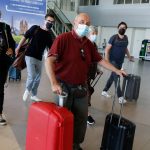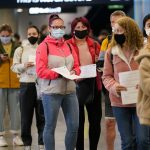The UK has reported a further 22 coronavirus-related deaths and 2,396 new cases in the latest 24-hour period, according to government figures.
Last Wednesday, 2,491 daily cases were recorded and 38 deaths – suggesting both cases and deaths have fallen slightly.
The data also showed 107,622 people had their first COVID-19 vaccine dose on Tuesday, taking the total to 33,139,742.
Some 350,027 had their second jab on Tuesday.
On Monday, the government revealed more than 10 million people have now had both shots, with this figure rising to 10,775,817 in the latest update.
Live COVID updates from UK and around world
It means one in five adults are now fully vaccinated against coronavirus.
Among those aged 80 and over – one of the first groups on the priority list for jabs – around three-quarters of people in England have had both doses of a vaccine, according to NHS figures released last week.
In Wales, this figure was 78%, while roughly 80% of this age group in Scotland and 42% in Northern Ireland have had both doses.
Wales is currently leading the rest of the UK in both first and second doses, having given a first jab to 67.9% of its adult population.
There was good news for the vaccination programme earlier, as data showed fewer than 2% of frail and elderly people admitted to hospital experienced coronavirus symptoms if they had had a single vaccine dose three weeks before.
In the study, which looked at more than 74,000 hospital admissions between September and early March, there was a sharp drop-off in the number of people experiencing COVID symptoms 21 days after having a jab.
Most people who did have coronavirus symptoms after having a jab had become infected before their immune system had a chance to respond to the vaccine.
Despite the positive findings, scientists and the prime minister have warned there will be a third wave of coronavirus cases.
Professor Adam Finn, a member of the Joint Committee on Vaccination and Immunisation (JCVI), said: “The models that we’ve seen on JCVI clearly point to a summer surge in cases as the lockdown is relaxed, because there are still many people in the adult population who’ve not been immunised and who will therefore start to transmit the infection between each other.”
He told BBC Breakfast the size of a third wave “depends on how quickly the vaccine rollout continues forward, the supplies of vaccine and so on, and how many people come forward to receive vaccination, and also it depends on how people behave as the lockdown is gradually relaxed”.
“The sense that the problem is all over, I’m afraid… is a flawed one, we’re still in a vulnerable situation, and there are still significant numbers of people who potentially could be harmed by this infection if this happens,” he added.






















